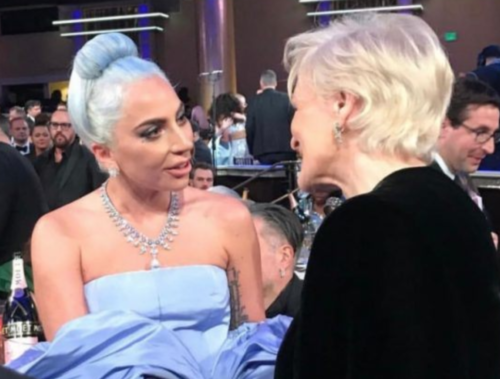As Hollywood becomes increasingly determined to make good on their promise about incorporating equality at every level of the industry, the Hollywood Foreign Press seemed more hellbent than ever on proving a point with their selections last night at the seventy-sixth annual Golden Globe Awards. From Sandra Oh’s win for Best Performance by an Actress in a Television Series – Drama in Killing Eve (significantly marking the first time an Asian actress has won more than two Golden Globes) to Mahershala Ali’s win for Best Actor in a Supporting Role for Green Book, the message was heard loud and clear: Hollywood has finally started to catch up with the diversity audiences have been craving.
To that end, there were still plenty of predictable white male wins, including a Lifetime Achievement Award for Jeff Bridges, Michael Douglas for Best Performance by an Actor in a Television Series – Musical or Comedy in The Kominsky Method and Christian Bale for his role as Dick Cheney in Vice. In a speech that found him noting how much people seem to love him in the roles of reviled characters, Bale remarked that he wanted to thank Satan for giving him the ultimate inspiration in how to slip into the mindset of Cheney (it’s definitely something Patrick Bateman would do). It was a comment that spoke to a line If Beale Street Could Talk about “white man must be the devil.”
But then, so is white woman, at times. Given the pity award (with the retrospect of losing Best Actress) of Best Original Song to cushion the blow, another predictable white lady win for the evening was projected to be Lady Gaga for her role as Ally in the oft remade A Star Is Born (but, truth be told, how can one ever compare to the Dorothy Parker-penned version of the script?). Praised for her “authentic” performance and chemistry with director and co-star Bradley Cooper, Lady Gaga had clearly dressed to win. And apparently, no one was more surprised than Glenn Close herself by the shift of favor toward a far more feminist narrative in the form of The Wife, based on Meg Wolitzer’s 2003 novel of the same name, in which Close plays Joan Archer. As a woman who has surrendered her writing talents to her husband for the sake of having them, at the very least, read by the world as opposed to locked away in a drawer, Joan realizes at some point that she’s made a huge mistake in undermining her own worth so easily thanks to naturally accepted misogyny (particularly in the literary world, an area that still very much needs to experience its own reckoning). Yes, it smacks of Big Eyes. Except for Joan, the decision to let Joseph (Jonathan Pryce) lay claim to her work is less out of love than it is a desire for her work to be known–fully aware that women writers are never given a chance, a fact further corroborated from her insider’s position as a secretary at a publishing house. That’s right, secretary. Not even a reader.
Decades later, as Joseph has gone on to receive the Nobel Prize in Literature, Joan at last finds the voice she could only seem to funnel into “his” novels (all of which she has ghostwritten). To this end, Close’s heartfelt speech about women being congenitally programmed to fulfill the part of “nurturer” in contrast to being able to find their own life’s purpose and meaning spoke to the sea change connoted by her win. Not only is the film an empowering look at how it’s never too late to stand up for yourself, but it also proves another very important element with regard to how Hollywood has always behaved when considering their winners: with unbridled ageism. That Glenn Close could beat out the “more aesthetically desirable” Lady Gaga based on her abilities and not her age bracket or appearance shows promising strides for a city that practically invented plastic surgery (which Lady Gaga actually has more of than Glenn Close).
What’s more, A Star Is Born is a narrative about a man plucking a woman from obscurity. About his approval suddenly giving her the strength to find her voice (though Gaga was clearly comfortable enough losing most of it to Mark Ronson during the acceptance speech for Best Original Song). It is through his validation that she finally finds enough courage to believe in herself. And then when she gets more famous, of course he acts like a total jealous asshole. While Joan might never reveal the truth about Joseph’s novels to the public, she at least has, finally, the strong sense of identity and purpose to break free of him (even if that freedom is helmed by a twist of fate), just as many women have seemed to do from the clutches of ever-waning studio system patriarchy.
On a side note, clearly Michael Douglas and Glenn Close set a precedent for topping themselves forever after Fatal Attraction based on last night’s awards.




















